ADMS 3930: Analysis of Tesco's Food Waste Management Strategies
VerifiedAdded on 2023/04/26
|15
|3354
|359
Report
AI Summary
This report examines the escalating issue of food wastage at Tesco, a major retail organization, highlighting the increasing waste volume and its negative impact on the company's financial stability and sustainability efforts. The analysis delves into the problem using management theories such as the Rendanheyi Model and Porter's Shared Value, exploring ethical considerations, and applying Porter's five forces to assess the competitive landscape. The report identifies the lack of operational initiatives and supply chain inefficiencies as key contributors to the problem. It proposes two alternative solutions: enhancing supply chain visibility through technological integration and enabling agility. The conclusion provides a final recommendation based on the analysis, aiming to improve Tesco's food waste management and overall business performance.
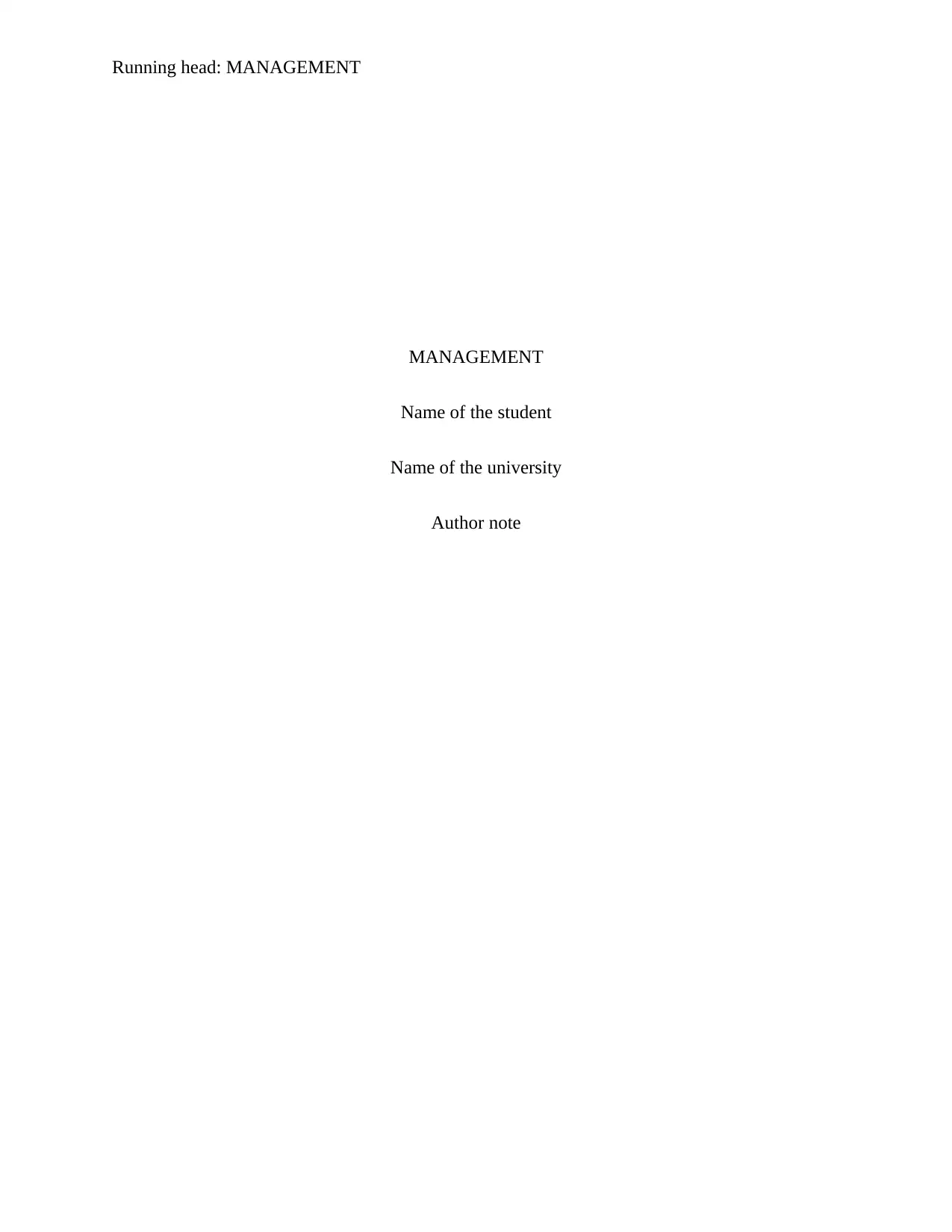
Running head: MANAGEMENT
MANAGEMENT
Name of the student
Name of the university
Author note
MANAGEMENT
Name of the student
Name of the university
Author note
Paraphrase This Document
Need a fresh take? Get an instant paraphrase of this document with our AI Paraphraser
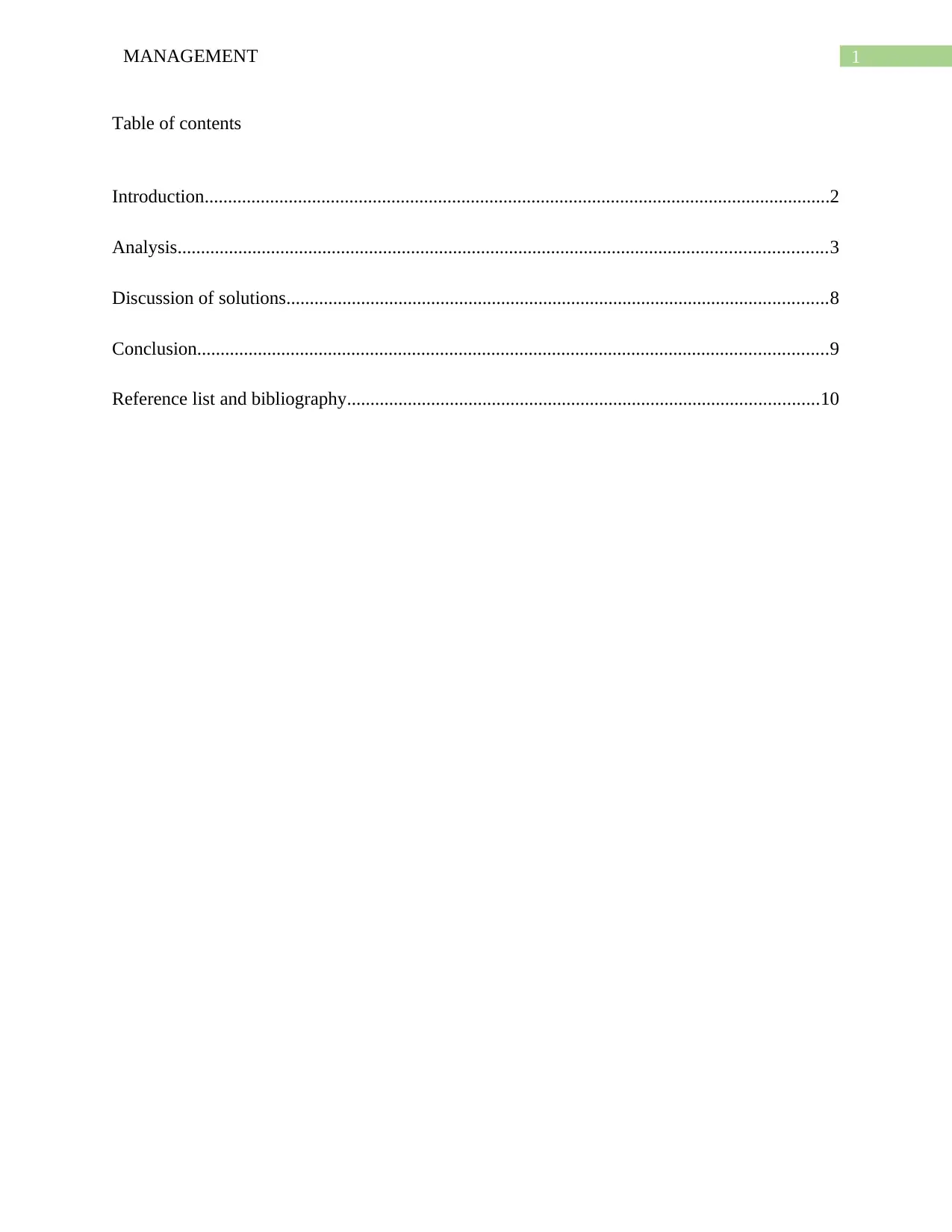
1MANAGEMENT
Table of contents
Introduction......................................................................................................................................2
Analysis...........................................................................................................................................3
Discussion of solutions....................................................................................................................8
Conclusion.......................................................................................................................................9
Reference list and bibliography.....................................................................................................10
Table of contents
Introduction......................................................................................................................................2
Analysis...........................................................................................................................................3
Discussion of solutions....................................................................................................................8
Conclusion.......................................................................................................................................9
Reference list and bibliography.....................................................................................................10
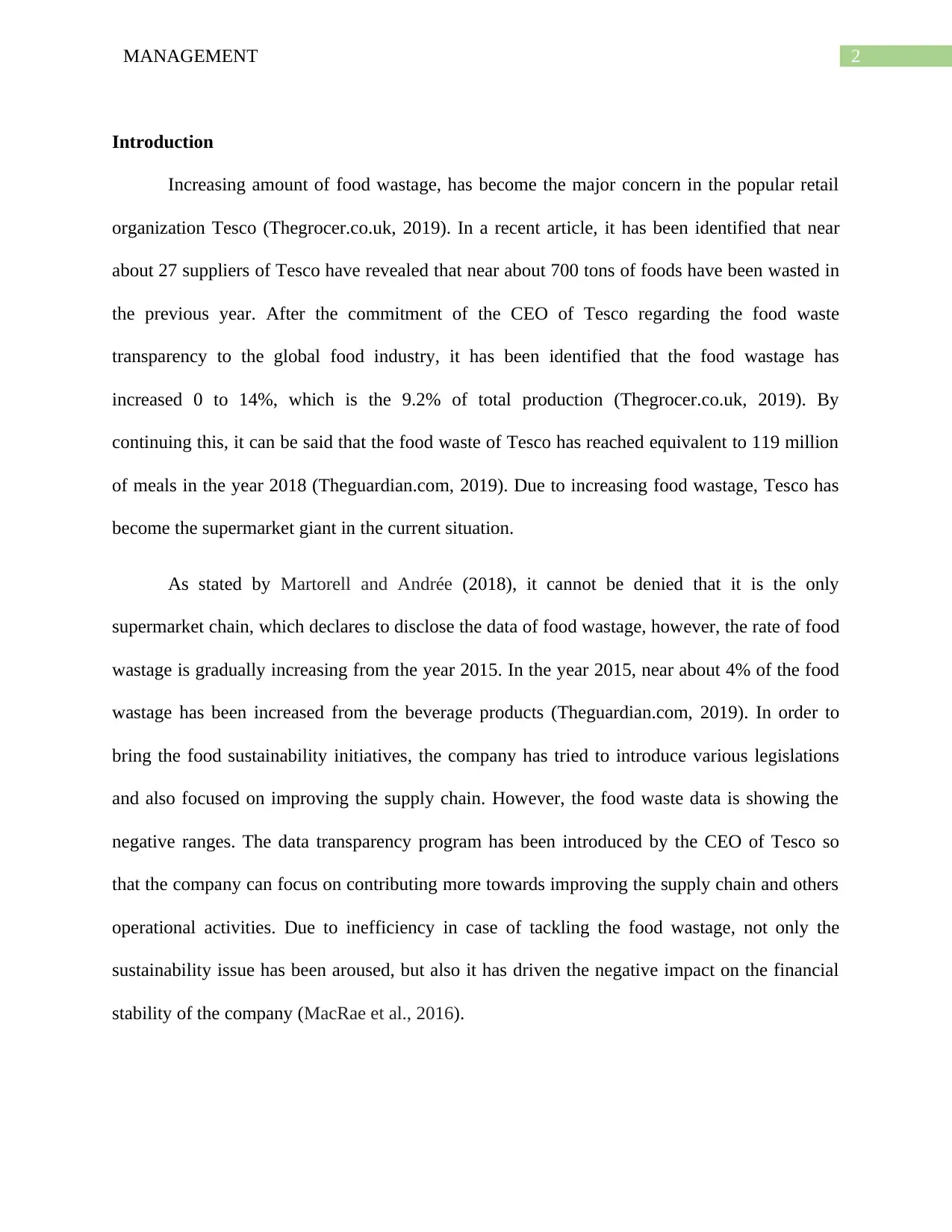
2MANAGEMENT
Introduction
Increasing amount of food wastage, has become the major concern in the popular retail
organization Tesco (Thegrocer.co.uk, 2019). In a recent article, it has been identified that near
about 27 suppliers of Tesco have revealed that near about 700 tons of foods have been wasted in
the previous year. After the commitment of the CEO of Tesco regarding the food waste
transparency to the global food industry, it has been identified that the food wastage has
increased 0 to 14%, which is the 9.2% of total production (Thegrocer.co.uk, 2019). By
continuing this, it can be said that the food waste of Tesco has reached equivalent to 119 million
of meals in the year 2018 (Theguardian.com, 2019). Due to increasing food wastage, Tesco has
become the supermarket giant in the current situation.
As stated by Martorell and Andrée (2018), it cannot be denied that it is the only
supermarket chain, which declares to disclose the data of food wastage, however, the rate of food
wastage is gradually increasing from the year 2015. In the year 2015, near about 4% of the food
wastage has been increased from the beverage products (Theguardian.com, 2019). In order to
bring the food sustainability initiatives, the company has tried to introduce various legislations
and also focused on improving the supply chain. However, the food waste data is showing the
negative ranges. The data transparency program has been introduced by the CEO of Tesco so
that the company can focus on contributing more towards improving the supply chain and others
operational activities. Due to inefficiency in case of tackling the food wastage, not only the
sustainability issue has been aroused, but also it has driven the negative impact on the financial
stability of the company (MacRae et al., 2016).
Introduction
Increasing amount of food wastage, has become the major concern in the popular retail
organization Tesco (Thegrocer.co.uk, 2019). In a recent article, it has been identified that near
about 27 suppliers of Tesco have revealed that near about 700 tons of foods have been wasted in
the previous year. After the commitment of the CEO of Tesco regarding the food waste
transparency to the global food industry, it has been identified that the food wastage has
increased 0 to 14%, which is the 9.2% of total production (Thegrocer.co.uk, 2019). By
continuing this, it can be said that the food waste of Tesco has reached equivalent to 119 million
of meals in the year 2018 (Theguardian.com, 2019). Due to increasing food wastage, Tesco has
become the supermarket giant in the current situation.
As stated by Martorell and Andrée (2018), it cannot be denied that it is the only
supermarket chain, which declares to disclose the data of food wastage, however, the rate of food
wastage is gradually increasing from the year 2015. In the year 2015, near about 4% of the food
wastage has been increased from the beverage products (Theguardian.com, 2019). In order to
bring the food sustainability initiatives, the company has tried to introduce various legislations
and also focused on improving the supply chain. However, the food waste data is showing the
negative ranges. The data transparency program has been introduced by the CEO of Tesco so
that the company can focus on contributing more towards improving the supply chain and others
operational activities. Due to inefficiency in case of tackling the food wastage, not only the
sustainability issue has been aroused, but also it has driven the negative impact on the financial
stability of the company (MacRae et al., 2016).
⊘ This is a preview!⊘
Do you want full access?
Subscribe today to unlock all pages.

Trusted by 1+ million students worldwide
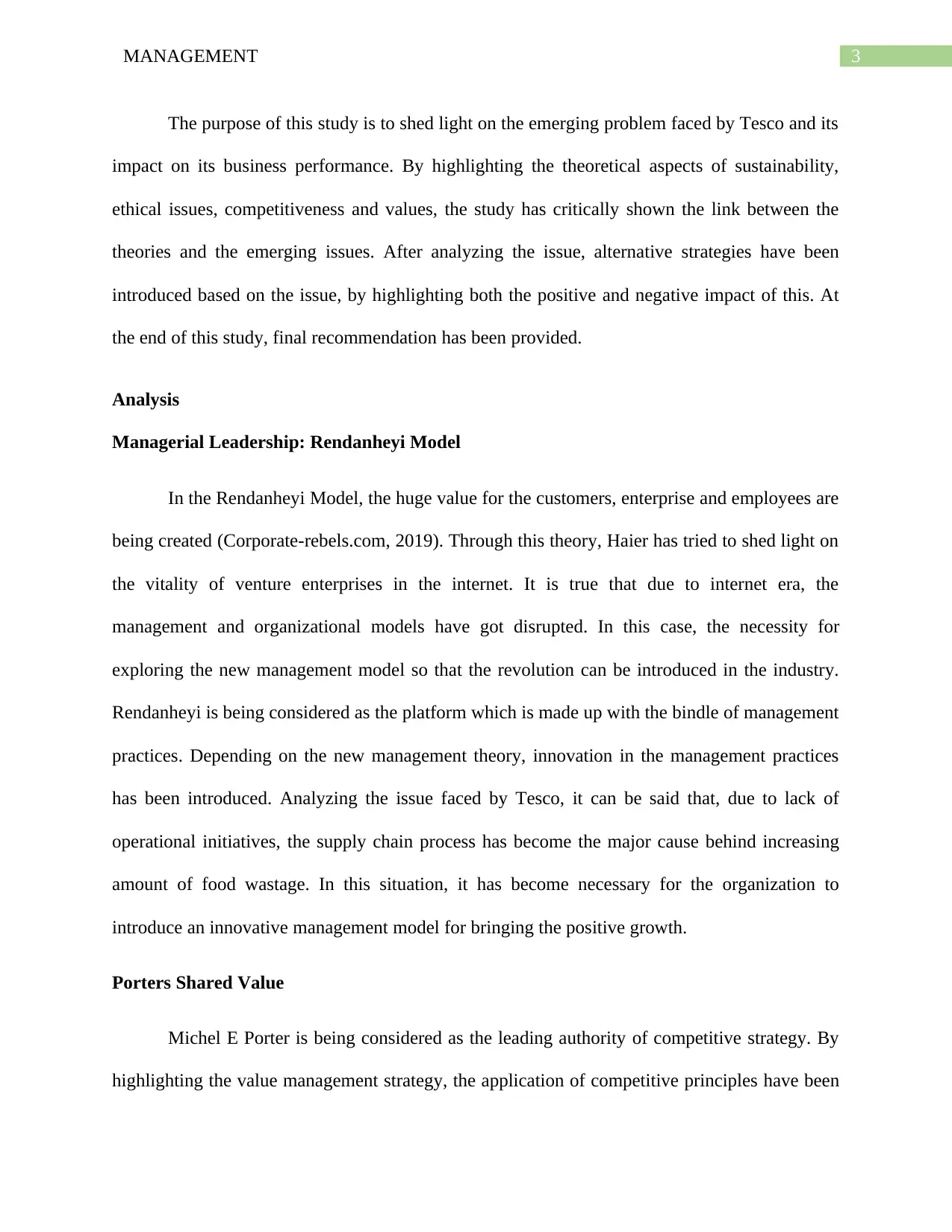
3MANAGEMENT
The purpose of this study is to shed light on the emerging problem faced by Tesco and its
impact on its business performance. By highlighting the theoretical aspects of sustainability,
ethical issues, competitiveness and values, the study has critically shown the link between the
theories and the emerging issues. After analyzing the issue, alternative strategies have been
introduced based on the issue, by highlighting both the positive and negative impact of this. At
the end of this study, final recommendation has been provided.
Analysis
Managerial Leadership: Rendanheyi Model
In the Rendanheyi Model, the huge value for the customers, enterprise and employees are
being created (Corporate-rebels.com, 2019). Through this theory, Haier has tried to shed light on
the vitality of venture enterprises in the internet. It is true that due to internet era, the
management and organizational models have got disrupted. In this case, the necessity for
exploring the new management model so that the revolution can be introduced in the industry.
Rendanheyi is being considered as the platform which is made up with the bindle of management
practices. Depending on the new management theory, innovation in the management practices
has been introduced. Analyzing the issue faced by Tesco, it can be said that, due to lack of
operational initiatives, the supply chain process has become the major cause behind increasing
amount of food wastage. In this situation, it has become necessary for the organization to
introduce an innovative management model for bringing the positive growth.
Porters Shared Value
Michel E Porter is being considered as the leading authority of competitive strategy. By
highlighting the value management strategy, the application of competitive principles have been
The purpose of this study is to shed light on the emerging problem faced by Tesco and its
impact on its business performance. By highlighting the theoretical aspects of sustainability,
ethical issues, competitiveness and values, the study has critically shown the link between the
theories and the emerging issues. After analyzing the issue, alternative strategies have been
introduced based on the issue, by highlighting both the positive and negative impact of this. At
the end of this study, final recommendation has been provided.
Analysis
Managerial Leadership: Rendanheyi Model
In the Rendanheyi Model, the huge value for the customers, enterprise and employees are
being created (Corporate-rebels.com, 2019). Through this theory, Haier has tried to shed light on
the vitality of venture enterprises in the internet. It is true that due to internet era, the
management and organizational models have got disrupted. In this case, the necessity for
exploring the new management model so that the revolution can be introduced in the industry.
Rendanheyi is being considered as the platform which is made up with the bindle of management
practices. Depending on the new management theory, innovation in the management practices
has been introduced. Analyzing the issue faced by Tesco, it can be said that, due to lack of
operational initiatives, the supply chain process has become the major cause behind increasing
amount of food wastage. In this situation, it has become necessary for the organization to
introduce an innovative management model for bringing the positive growth.
Porters Shared Value
Michel E Porter is being considered as the leading authority of competitive strategy. By
highlighting the value management strategy, the application of competitive principles have been
Paraphrase This Document
Need a fresh take? Get an instant paraphrase of this document with our AI Paraphraser
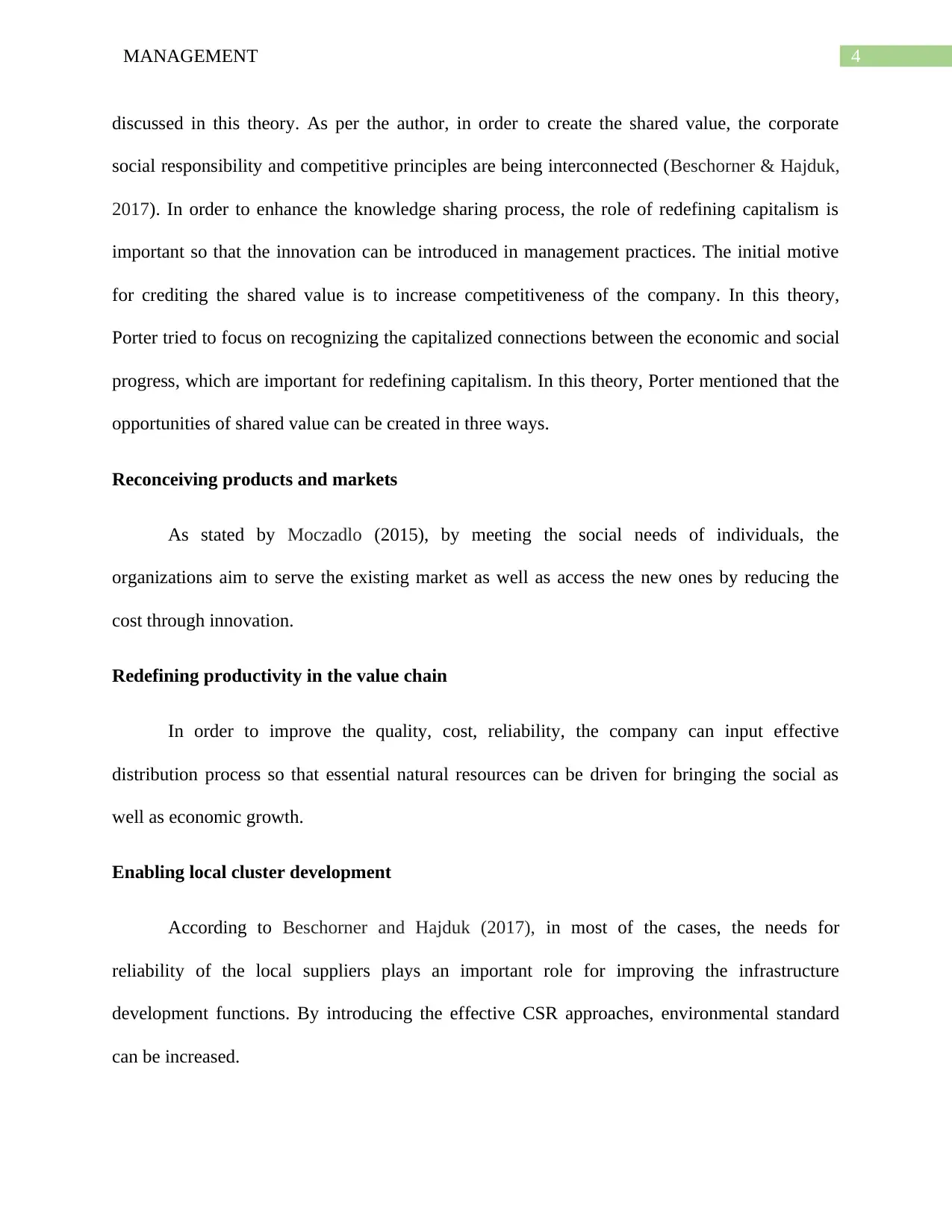
4MANAGEMENT
discussed in this theory. As per the author, in order to create the shared value, the corporate
social responsibility and competitive principles are being interconnected (Beschorner & Hajduk,
2017). In order to enhance the knowledge sharing process, the role of redefining capitalism is
important so that the innovation can be introduced in management practices. The initial motive
for crediting the shared value is to increase competitiveness of the company. In this theory,
Porter tried to focus on recognizing the capitalized connections between the economic and social
progress, which are important for redefining capitalism. In this theory, Porter mentioned that the
opportunities of shared value can be created in three ways.
Reconceiving products and markets
As stated by Moczadlo (2015), by meeting the social needs of individuals, the
organizations aim to serve the existing market as well as access the new ones by reducing the
cost through innovation.
Redefining productivity in the value chain
In order to improve the quality, cost, reliability, the company can input effective
distribution process so that essential natural resources can be driven for bringing the social as
well as economic growth.
Enabling local cluster development
According to Beschorner and Hajduk (2017), in most of the cases, the needs for
reliability of the local suppliers plays an important role for improving the infrastructure
development functions. By introducing the effective CSR approaches, environmental standard
can be increased.
discussed in this theory. As per the author, in order to create the shared value, the corporate
social responsibility and competitive principles are being interconnected (Beschorner & Hajduk,
2017). In order to enhance the knowledge sharing process, the role of redefining capitalism is
important so that the innovation can be introduced in management practices. The initial motive
for crediting the shared value is to increase competitiveness of the company. In this theory,
Porter tried to focus on recognizing the capitalized connections between the economic and social
progress, which are important for redefining capitalism. In this theory, Porter mentioned that the
opportunities of shared value can be created in three ways.
Reconceiving products and markets
As stated by Moczadlo (2015), by meeting the social needs of individuals, the
organizations aim to serve the existing market as well as access the new ones by reducing the
cost through innovation.
Redefining productivity in the value chain
In order to improve the quality, cost, reliability, the company can input effective
distribution process so that essential natural resources can be driven for bringing the social as
well as economic growth.
Enabling local cluster development
According to Beschorner and Hajduk (2017), in most of the cases, the needs for
reliability of the local suppliers plays an important role for improving the infrastructure
development functions. By introducing the effective CSR approaches, environmental standard
can be increased.
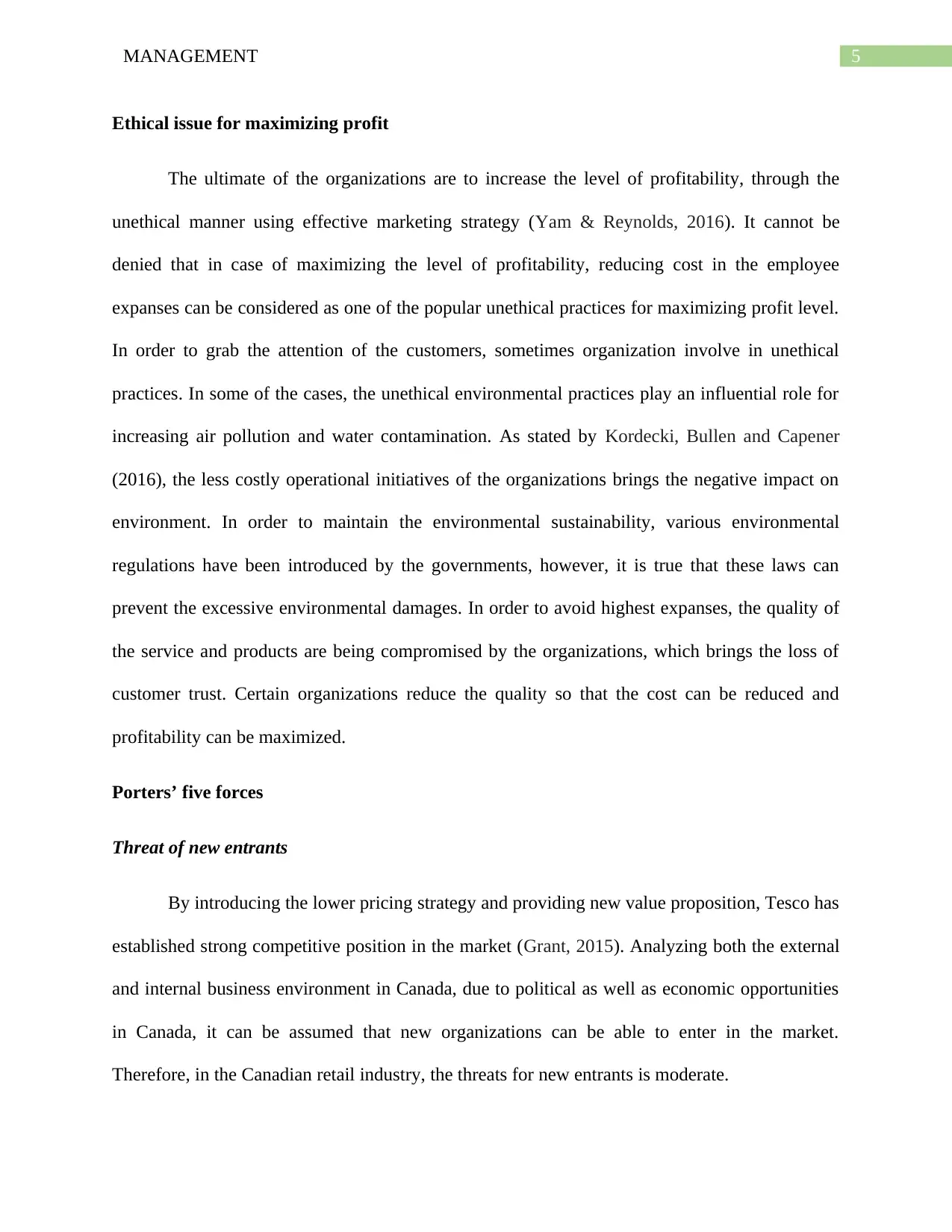
5MANAGEMENT
Ethical issue for maximizing profit
The ultimate of the organizations are to increase the level of profitability, through the
unethical manner using effective marketing strategy (Yam & Reynolds, 2016). It cannot be
denied that in case of maximizing the level of profitability, reducing cost in the employee
expanses can be considered as one of the popular unethical practices for maximizing profit level.
In order to grab the attention of the customers, sometimes organization involve in unethical
practices. In some of the cases, the unethical environmental practices play an influential role for
increasing air pollution and water contamination. As stated by Kordecki, Bullen and Capener
(2016), the less costly operational initiatives of the organizations brings the negative impact on
environment. In order to maintain the environmental sustainability, various environmental
regulations have been introduced by the governments, however, it is true that these laws can
prevent the excessive environmental damages. In order to avoid highest expanses, the quality of
the service and products are being compromised by the organizations, which brings the loss of
customer trust. Certain organizations reduce the quality so that the cost can be reduced and
profitability can be maximized.
Porters’ five forces
Threat of new entrants
By introducing the lower pricing strategy and providing new value proposition, Tesco has
established strong competitive position in the market (Grant, 2015). Analyzing both the external
and internal business environment in Canada, due to political as well as economic opportunities
in Canada, it can be assumed that new organizations can be able to enter in the market.
Therefore, in the Canadian retail industry, the threats for new entrants is moderate.
Ethical issue for maximizing profit
The ultimate of the organizations are to increase the level of profitability, through the
unethical manner using effective marketing strategy (Yam & Reynolds, 2016). It cannot be
denied that in case of maximizing the level of profitability, reducing cost in the employee
expanses can be considered as one of the popular unethical practices for maximizing profit level.
In order to grab the attention of the customers, sometimes organization involve in unethical
practices. In some of the cases, the unethical environmental practices play an influential role for
increasing air pollution and water contamination. As stated by Kordecki, Bullen and Capener
(2016), the less costly operational initiatives of the organizations brings the negative impact on
environment. In order to maintain the environmental sustainability, various environmental
regulations have been introduced by the governments, however, it is true that these laws can
prevent the excessive environmental damages. In order to avoid highest expanses, the quality of
the service and products are being compromised by the organizations, which brings the loss of
customer trust. Certain organizations reduce the quality so that the cost can be reduced and
profitability can be maximized.
Porters’ five forces
Threat of new entrants
By introducing the lower pricing strategy and providing new value proposition, Tesco has
established strong competitive position in the market (Grant, 2015). Analyzing both the external
and internal business environment in Canada, due to political as well as economic opportunities
in Canada, it can be assumed that new organizations can be able to enter in the market.
Therefore, in the Canadian retail industry, the threats for new entrants is moderate.
⊘ This is a preview!⊘
Do you want full access?
Subscribe today to unlock all pages.

Trusted by 1+ million students worldwide
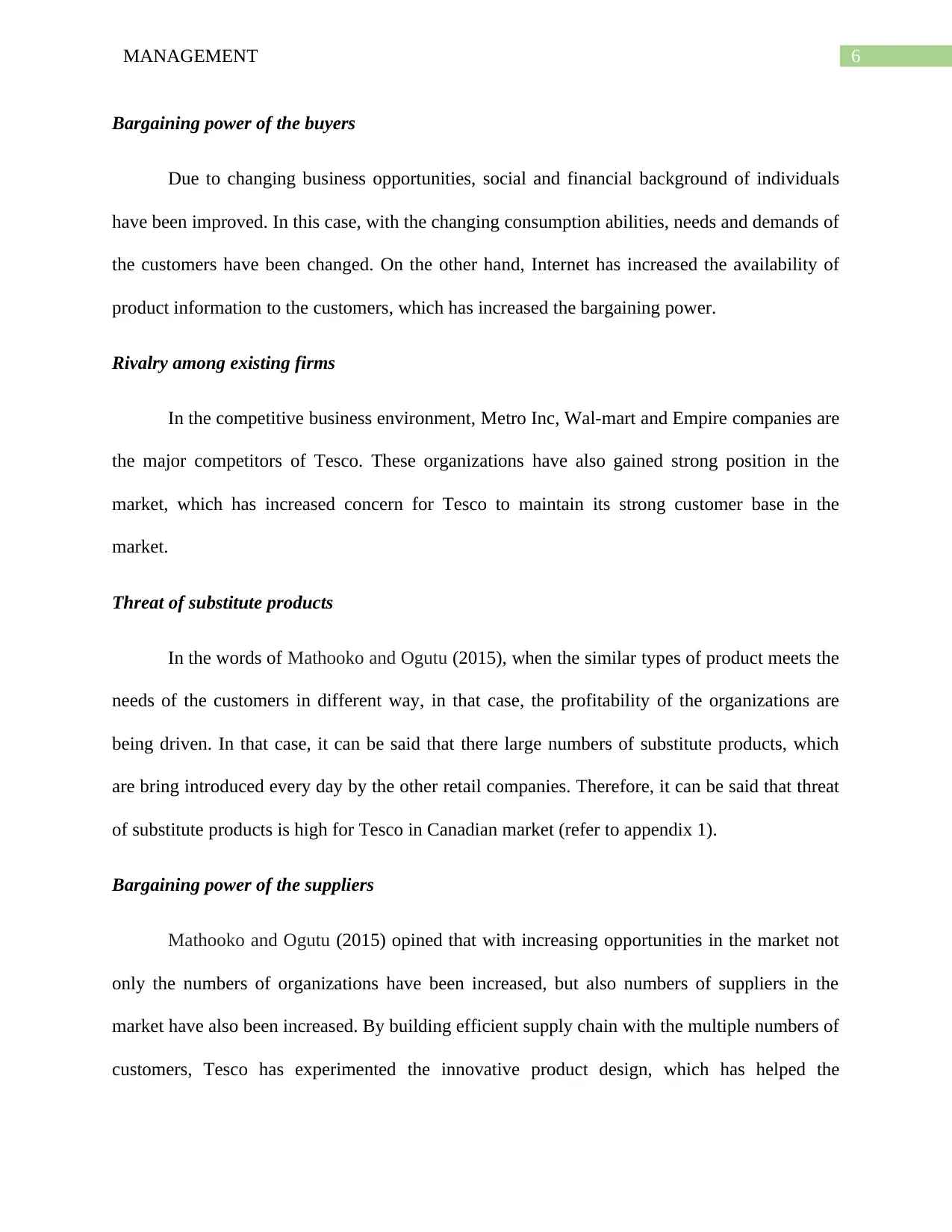
6MANAGEMENT
Bargaining power of the buyers
Due to changing business opportunities, social and financial background of individuals
have been improved. In this case, with the changing consumption abilities, needs and demands of
the customers have been changed. On the other hand, Internet has increased the availability of
product information to the customers, which has increased the bargaining power.
Rivalry among existing firms
In the competitive business environment, Metro Inc, Wal-mart and Empire companies are
the major competitors of Tesco. These organizations have also gained strong position in the
market, which has increased concern for Tesco to maintain its strong customer base in the
market.
Threat of substitute products
In the words of Mathooko and Ogutu (2015), when the similar types of product meets the
needs of the customers in different way, in that case, the profitability of the organizations are
being driven. In that case, it can be said that there large numbers of substitute products, which
are bring introduced every day by the other retail companies. Therefore, it can be said that threat
of substitute products is high for Tesco in Canadian market (refer to appendix 1).
Bargaining power of the suppliers
Mathooko and Ogutu (2015) opined that with increasing opportunities in the market not
only the numbers of organizations have been increased, but also numbers of suppliers in the
market have also been increased. By building efficient supply chain with the multiple numbers of
customers, Tesco has experimented the innovative product design, which has helped the
Bargaining power of the buyers
Due to changing business opportunities, social and financial background of individuals
have been improved. In this case, with the changing consumption abilities, needs and demands of
the customers have been changed. On the other hand, Internet has increased the availability of
product information to the customers, which has increased the bargaining power.
Rivalry among existing firms
In the competitive business environment, Metro Inc, Wal-mart and Empire companies are
the major competitors of Tesco. These organizations have also gained strong position in the
market, which has increased concern for Tesco to maintain its strong customer base in the
market.
Threat of substitute products
In the words of Mathooko and Ogutu (2015), when the similar types of product meets the
needs of the customers in different way, in that case, the profitability of the organizations are
being driven. In that case, it can be said that there large numbers of substitute products, which
are bring introduced every day by the other retail companies. Therefore, it can be said that threat
of substitute products is high for Tesco in Canadian market (refer to appendix 1).
Bargaining power of the suppliers
Mathooko and Ogutu (2015) opined that with increasing opportunities in the market not
only the numbers of organizations have been increased, but also numbers of suppliers in the
market have also been increased. By building efficient supply chain with the multiple numbers of
customers, Tesco has experimented the innovative product design, which has helped the
Paraphrase This Document
Need a fresh take? Get an instant paraphrase of this document with our AI Paraphraser
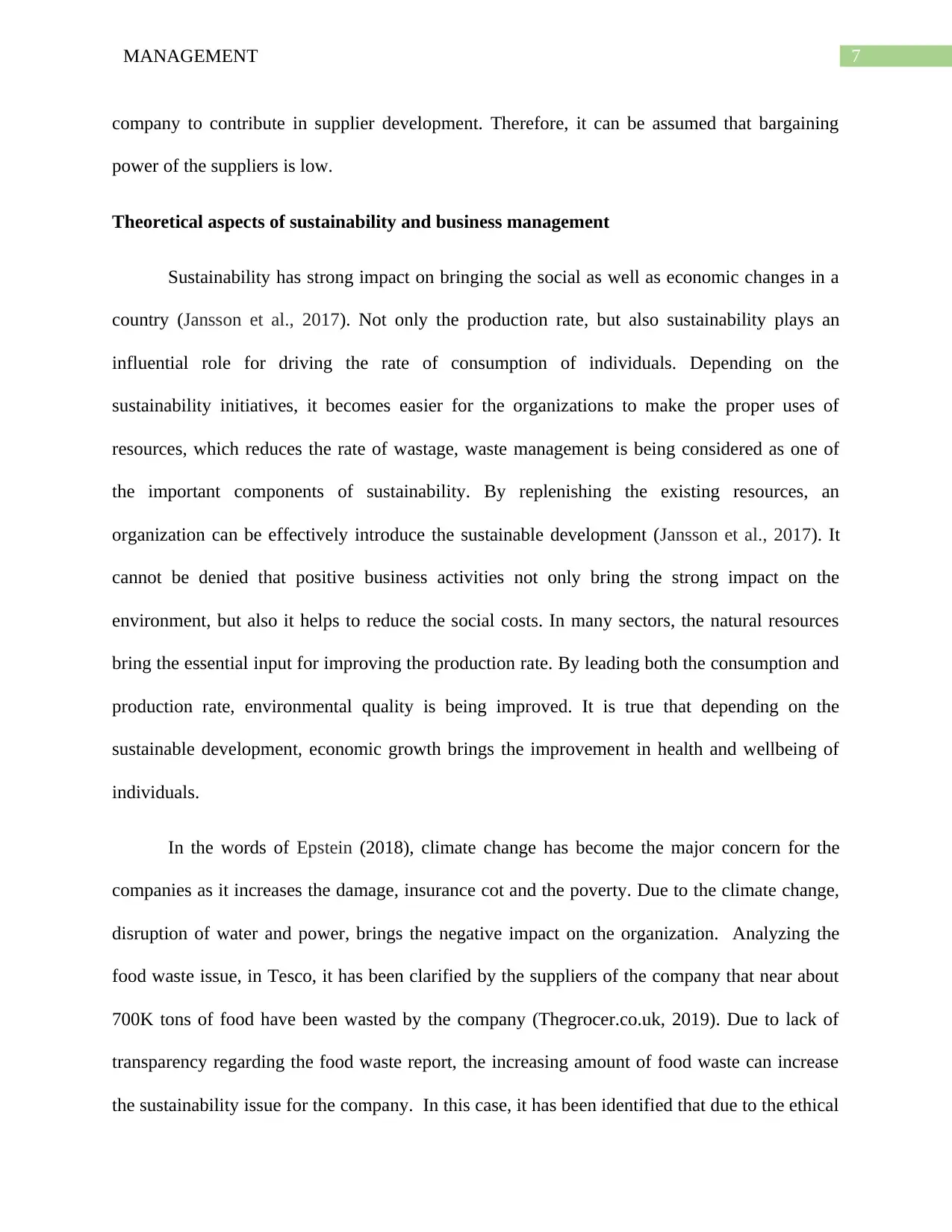
7MANAGEMENT
company to contribute in supplier development. Therefore, it can be assumed that bargaining
power of the suppliers is low.
Theoretical aspects of sustainability and business management
Sustainability has strong impact on bringing the social as well as economic changes in a
country (Jansson et al., 2017). Not only the production rate, but also sustainability plays an
influential role for driving the rate of consumption of individuals. Depending on the
sustainability initiatives, it becomes easier for the organizations to make the proper uses of
resources, which reduces the rate of wastage, waste management is being considered as one of
the important components of sustainability. By replenishing the existing resources, an
organization can be effectively introduce the sustainable development (Jansson et al., 2017). It
cannot be denied that positive business activities not only bring the strong impact on the
environment, but also it helps to reduce the social costs. In many sectors, the natural resources
bring the essential input for improving the production rate. By leading both the consumption and
production rate, environmental quality is being improved. It is true that depending on the
sustainable development, economic growth brings the improvement in health and wellbeing of
individuals.
In the words of Epstein (2018), climate change has become the major concern for the
companies as it increases the damage, insurance cot and the poverty. Due to the climate change,
disruption of water and power, brings the negative impact on the organization. Analyzing the
food waste issue, in Tesco, it has been clarified by the suppliers of the company that near about
700K tons of food have been wasted by the company (Thegrocer.co.uk, 2019). Due to lack of
transparency regarding the food waste report, the increasing amount of food waste can increase
the sustainability issue for the company. In this case, it has been identified that due to the ethical
company to contribute in supplier development. Therefore, it can be assumed that bargaining
power of the suppliers is low.
Theoretical aspects of sustainability and business management
Sustainability has strong impact on bringing the social as well as economic changes in a
country (Jansson et al., 2017). Not only the production rate, but also sustainability plays an
influential role for driving the rate of consumption of individuals. Depending on the
sustainability initiatives, it becomes easier for the organizations to make the proper uses of
resources, which reduces the rate of wastage, waste management is being considered as one of
the important components of sustainability. By replenishing the existing resources, an
organization can be effectively introduce the sustainable development (Jansson et al., 2017). It
cannot be denied that positive business activities not only bring the strong impact on the
environment, but also it helps to reduce the social costs. In many sectors, the natural resources
bring the essential input for improving the production rate. By leading both the consumption and
production rate, environmental quality is being improved. It is true that depending on the
sustainable development, economic growth brings the improvement in health and wellbeing of
individuals.
In the words of Epstein (2018), climate change has become the major concern for the
companies as it increases the damage, insurance cot and the poverty. Due to the climate change,
disruption of water and power, brings the negative impact on the organization. Analyzing the
food waste issue, in Tesco, it has been clarified by the suppliers of the company that near about
700K tons of food have been wasted by the company (Thegrocer.co.uk, 2019). Due to lack of
transparency regarding the food waste report, the increasing amount of food waste can increase
the sustainability issue for the company. In this case, it has been identified that due to the ethical
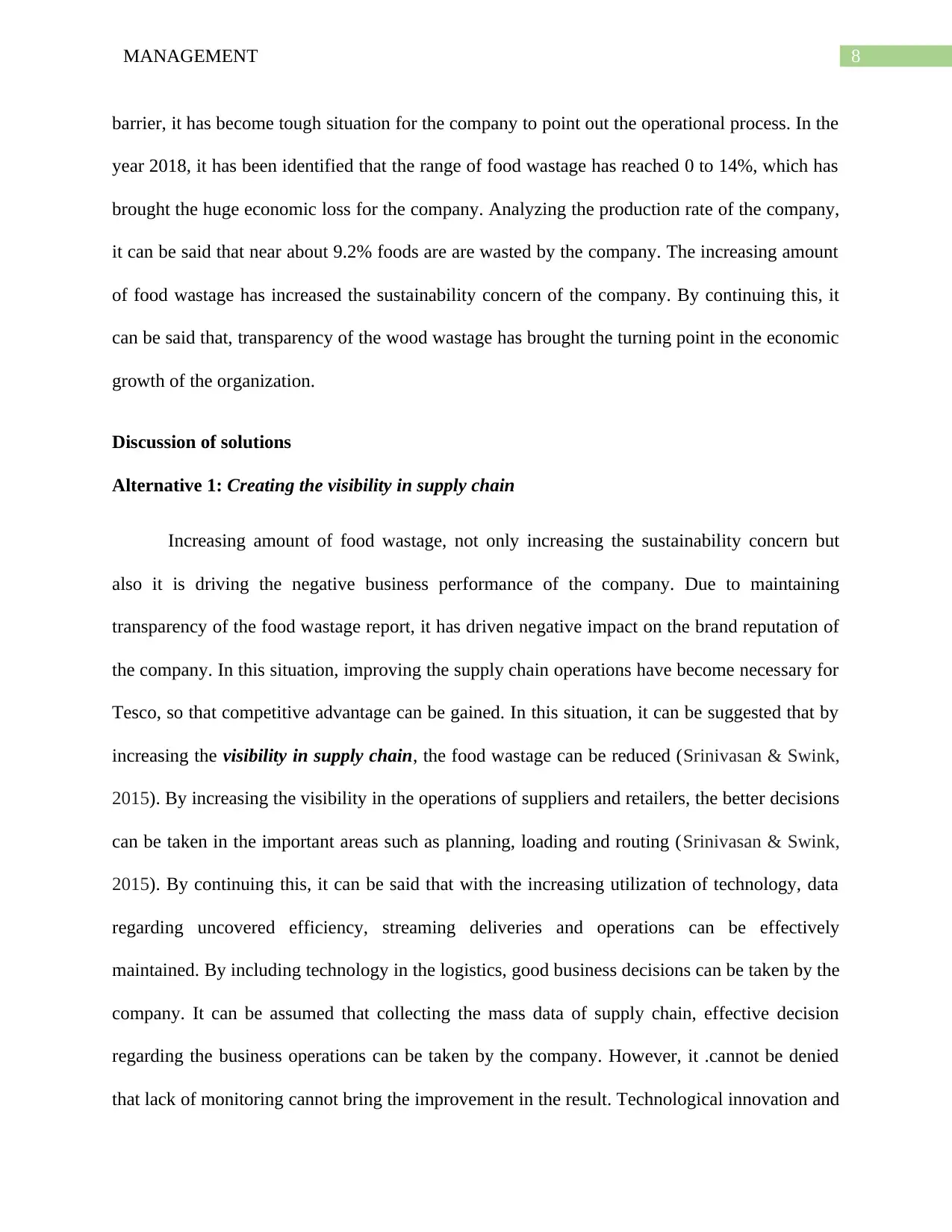
8MANAGEMENT
barrier, it has become tough situation for the company to point out the operational process. In the
year 2018, it has been identified that the range of food wastage has reached 0 to 14%, which has
brought the huge economic loss for the company. Analyzing the production rate of the company,
it can be said that near about 9.2% foods are are wasted by the company. The increasing amount
of food wastage has increased the sustainability concern of the company. By continuing this, it
can be said that, transparency of the wood wastage has brought the turning point in the economic
growth of the organization.
Discussion of solutions
Alternative 1: Creating the visibility in supply chain
Increasing amount of food wastage, not only increasing the sustainability concern but
also it is driving the negative business performance of the company. Due to maintaining
transparency of the food wastage report, it has driven negative impact on the brand reputation of
the company. In this situation, improving the supply chain operations have become necessary for
Tesco, so that competitive advantage can be gained. In this situation, it can be suggested that by
increasing the visibility in supply chain, the food wastage can be reduced (Srinivasan & Swink,
2015). By increasing the visibility in the operations of suppliers and retailers, the better decisions
can be taken in the important areas such as planning, loading and routing (Srinivasan & Swink,
2015). By continuing this, it can be said that with the increasing utilization of technology, data
regarding uncovered efficiency, streaming deliveries and operations can be effectively
maintained. By including technology in the logistics, good business decisions can be taken by the
company. It can be assumed that collecting the mass data of supply chain, effective decision
regarding the business operations can be taken by the company. However, it .cannot be denied
that lack of monitoring cannot bring the improvement in the result. Technological innovation and
barrier, it has become tough situation for the company to point out the operational process. In the
year 2018, it has been identified that the range of food wastage has reached 0 to 14%, which has
brought the huge economic loss for the company. Analyzing the production rate of the company,
it can be said that near about 9.2% foods are are wasted by the company. The increasing amount
of food wastage has increased the sustainability concern of the company. By continuing this, it
can be said that, transparency of the wood wastage has brought the turning point in the economic
growth of the organization.
Discussion of solutions
Alternative 1: Creating the visibility in supply chain
Increasing amount of food wastage, not only increasing the sustainability concern but
also it is driving the negative business performance of the company. Due to maintaining
transparency of the food wastage report, it has driven negative impact on the brand reputation of
the company. In this situation, improving the supply chain operations have become necessary for
Tesco, so that competitive advantage can be gained. In this situation, it can be suggested that by
increasing the visibility in supply chain, the food wastage can be reduced (Srinivasan & Swink,
2015). By increasing the visibility in the operations of suppliers and retailers, the better decisions
can be taken in the important areas such as planning, loading and routing (Srinivasan & Swink,
2015). By continuing this, it can be said that with the increasing utilization of technology, data
regarding uncovered efficiency, streaming deliveries and operations can be effectively
maintained. By including technology in the logistics, good business decisions can be taken by the
company. It can be assumed that collecting the mass data of supply chain, effective decision
regarding the business operations can be taken by the company. However, it .cannot be denied
that lack of monitoring cannot bring the improvement in the result. Technological innovation and
⊘ This is a preview!⊘
Do you want full access?
Subscribe today to unlock all pages.

Trusted by 1+ million students worldwide
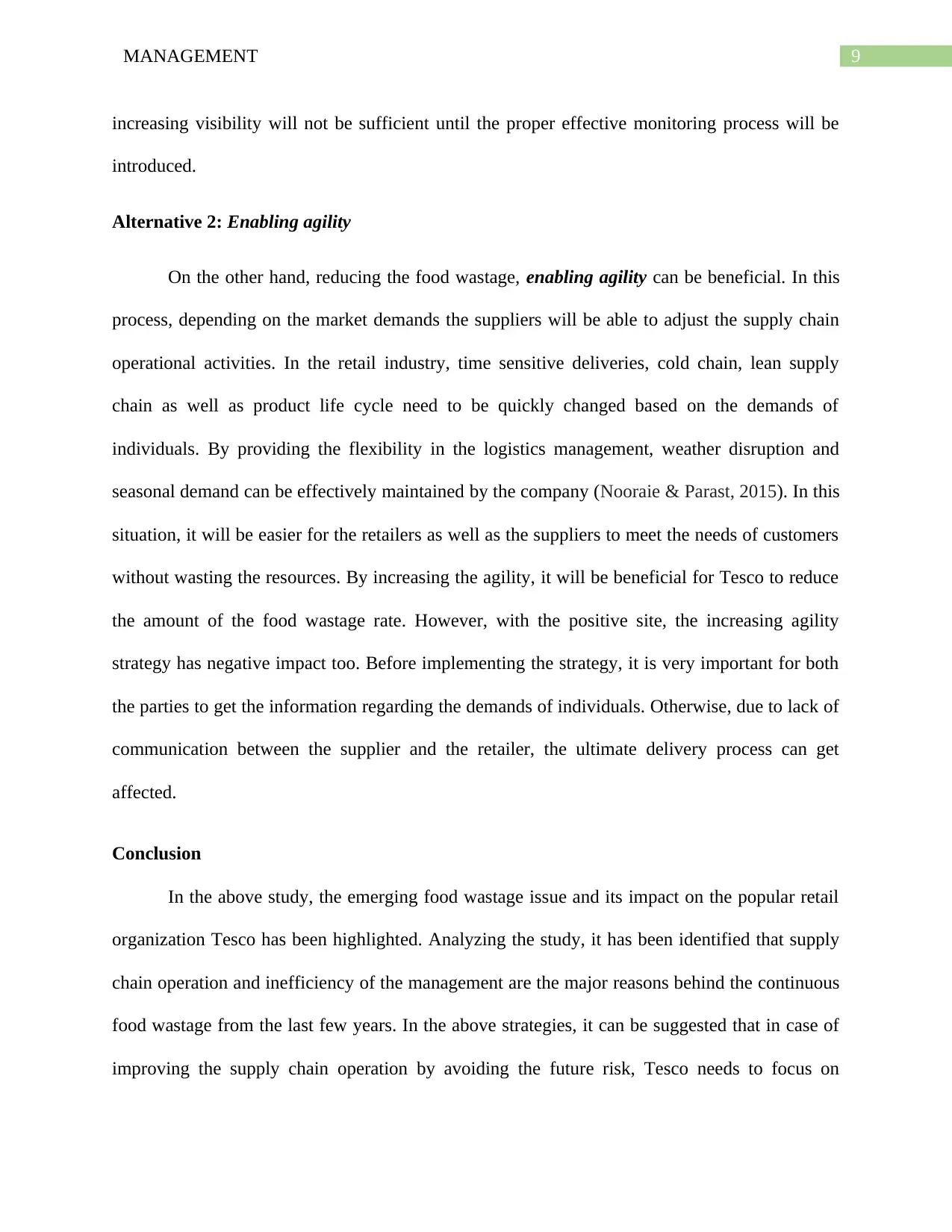
9MANAGEMENT
increasing visibility will not be sufficient until the proper effective monitoring process will be
introduced.
Alternative 2: Enabling agility
On the other hand, reducing the food wastage, enabling agility can be beneficial. In this
process, depending on the market demands the suppliers will be able to adjust the supply chain
operational activities. In the retail industry, time sensitive deliveries, cold chain, lean supply
chain as well as product life cycle need to be quickly changed based on the demands of
individuals. By providing the flexibility in the logistics management, weather disruption and
seasonal demand can be effectively maintained by the company (Nooraie & Parast, 2015). In this
situation, it will be easier for the retailers as well as the suppliers to meet the needs of customers
without wasting the resources. By increasing the agility, it will be beneficial for Tesco to reduce
the amount of the food wastage rate. However, with the positive site, the increasing agility
strategy has negative impact too. Before implementing the strategy, it is very important for both
the parties to get the information regarding the demands of individuals. Otherwise, due to lack of
communication between the supplier and the retailer, the ultimate delivery process can get
affected.
Conclusion
In the above study, the emerging food wastage issue and its impact on the popular retail
organization Tesco has been highlighted. Analyzing the study, it has been identified that supply
chain operation and inefficiency of the management are the major reasons behind the continuous
food wastage from the last few years. In the above strategies, it can be suggested that in case of
improving the supply chain operation by avoiding the future risk, Tesco needs to focus on
increasing visibility will not be sufficient until the proper effective monitoring process will be
introduced.
Alternative 2: Enabling agility
On the other hand, reducing the food wastage, enabling agility can be beneficial. In this
process, depending on the market demands the suppliers will be able to adjust the supply chain
operational activities. In the retail industry, time sensitive deliveries, cold chain, lean supply
chain as well as product life cycle need to be quickly changed based on the demands of
individuals. By providing the flexibility in the logistics management, weather disruption and
seasonal demand can be effectively maintained by the company (Nooraie & Parast, 2015). In this
situation, it will be easier for the retailers as well as the suppliers to meet the needs of customers
without wasting the resources. By increasing the agility, it will be beneficial for Tesco to reduce
the amount of the food wastage rate. However, with the positive site, the increasing agility
strategy has negative impact too. Before implementing the strategy, it is very important for both
the parties to get the information regarding the demands of individuals. Otherwise, due to lack of
communication between the supplier and the retailer, the ultimate delivery process can get
affected.
Conclusion
In the above study, the emerging food wastage issue and its impact on the popular retail
organization Tesco has been highlighted. Analyzing the study, it has been identified that supply
chain operation and inefficiency of the management are the major reasons behind the continuous
food wastage from the last few years. In the above strategies, it can be suggested that in case of
improving the supply chain operation by avoiding the future risk, Tesco needs to focus on
Paraphrase This Document
Need a fresh take? Get an instant paraphrase of this document with our AI Paraphraser
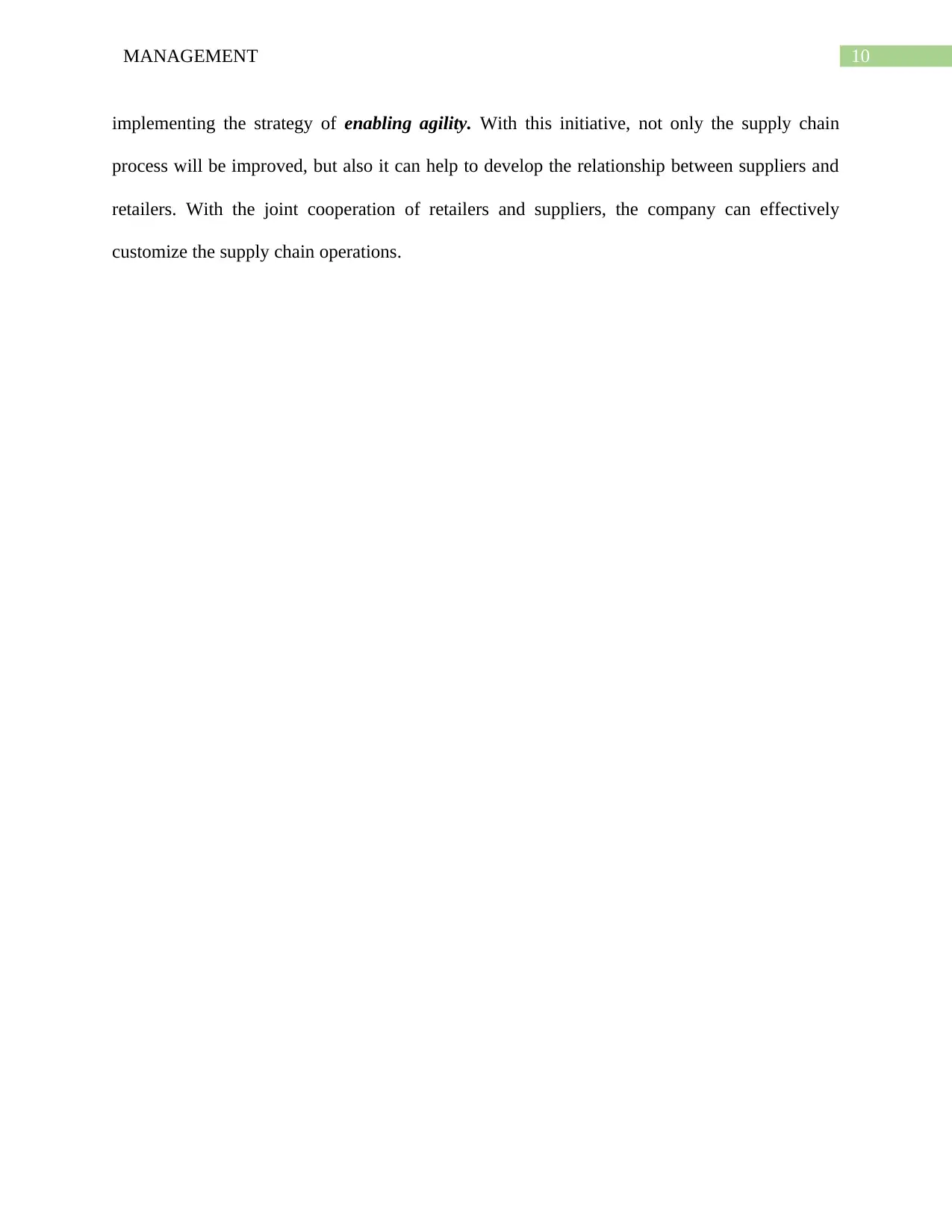
10MANAGEMENT
implementing the strategy of enabling agility. With this initiative, not only the supply chain
process will be improved, but also it can help to develop the relationship between suppliers and
retailers. With the joint cooperation of retailers and suppliers, the company can effectively
customize the supply chain operations.
implementing the strategy of enabling agility. With this initiative, not only the supply chain
process will be improved, but also it can help to develop the relationship between suppliers and
retailers. With the joint cooperation of retailers and suppliers, the company can effectively
customize the supply chain operations.
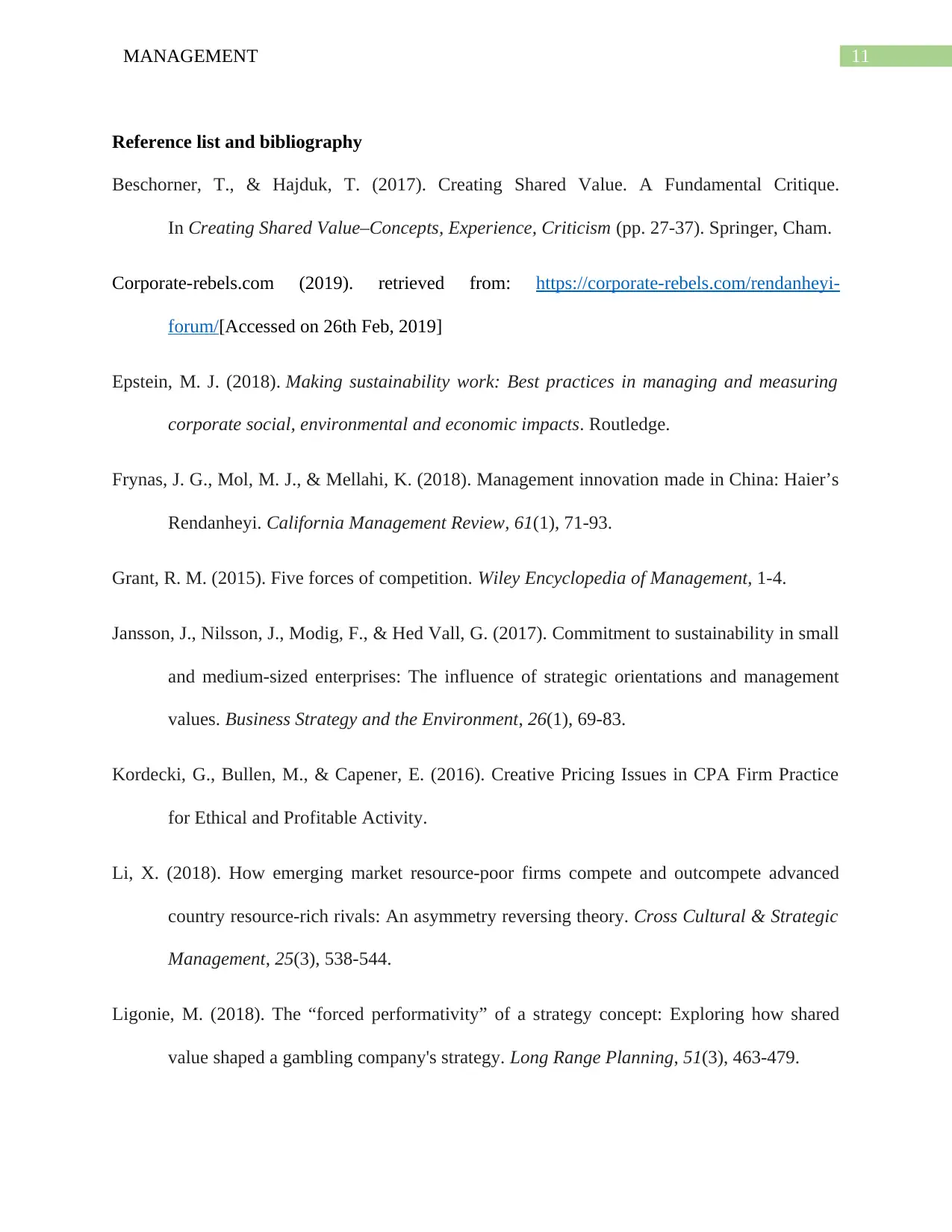
11MANAGEMENT
Reference list and bibliography
Beschorner, T., & Hajduk, T. (2017). Creating Shared Value. A Fundamental Critique.
In Creating Shared Value–Concepts, Experience, Criticism (pp. 27-37). Springer, Cham.
Corporate-rebels.com (2019). retrieved from: https://corporate-rebels.com/rendanheyi-
forum/[Accessed on 26th Feb, 2019]
Epstein, M. J. (2018). Making sustainability work: Best practices in managing and measuring
corporate social, environmental and economic impacts. Routledge.
Frynas, J. G., Mol, M. J., & Mellahi, K. (2018). Management innovation made in China: Haier’s
Rendanheyi. California Management Review, 61(1), 71-93.
Grant, R. M. (2015). Five forces of competition. Wiley Encyclopedia of Management, 1-4.
Jansson, J., Nilsson, J., Modig, F., & Hed Vall, G. (2017). Commitment to sustainability in small
and medium‐sized enterprises: The influence of strategic orientations and management
values. Business Strategy and the Environment, 26(1), 69-83.
Kordecki, G., Bullen, M., & Capener, E. (2016). Creative Pricing Issues in CPA Firm Practice
for Ethical and Profitable Activity.
Li, X. (2018). How emerging market resource-poor firms compete and outcompete advanced
country resource-rich rivals: An asymmetry reversing theory. Cross Cultural & Strategic
Management, 25(3), 538-544.
Ligonie, M. (2018). The “forced performativity” of a strategy concept: Exploring how shared
value shaped a gambling company's strategy. Long Range Planning, 51(3), 463-479.
Reference list and bibliography
Beschorner, T., & Hajduk, T. (2017). Creating Shared Value. A Fundamental Critique.
In Creating Shared Value–Concepts, Experience, Criticism (pp. 27-37). Springer, Cham.
Corporate-rebels.com (2019). retrieved from: https://corporate-rebels.com/rendanheyi-
forum/[Accessed on 26th Feb, 2019]
Epstein, M. J. (2018). Making sustainability work: Best practices in managing and measuring
corporate social, environmental and economic impacts. Routledge.
Frynas, J. G., Mol, M. J., & Mellahi, K. (2018). Management innovation made in China: Haier’s
Rendanheyi. California Management Review, 61(1), 71-93.
Grant, R. M. (2015). Five forces of competition. Wiley Encyclopedia of Management, 1-4.
Jansson, J., Nilsson, J., Modig, F., & Hed Vall, G. (2017). Commitment to sustainability in small
and medium‐sized enterprises: The influence of strategic orientations and management
values. Business Strategy and the Environment, 26(1), 69-83.
Kordecki, G., Bullen, M., & Capener, E. (2016). Creative Pricing Issues in CPA Firm Practice
for Ethical and Profitable Activity.
Li, X. (2018). How emerging market resource-poor firms compete and outcompete advanced
country resource-rich rivals: An asymmetry reversing theory. Cross Cultural & Strategic
Management, 25(3), 538-544.
Ligonie, M. (2018). The “forced performativity” of a strategy concept: Exploring how shared
value shaped a gambling company's strategy. Long Range Planning, 51(3), 463-479.
⊘ This is a preview!⊘
Do you want full access?
Subscribe today to unlock all pages.

Trusted by 1+ million students worldwide
1 out of 15
Related Documents
Your All-in-One AI-Powered Toolkit for Academic Success.
+13062052269
info@desklib.com
Available 24*7 on WhatsApp / Email
![[object Object]](/_next/static/media/star-bottom.7253800d.svg)
Unlock your academic potential
Copyright © 2020–2026 A2Z Services. All Rights Reserved. Developed and managed by ZUCOL.





